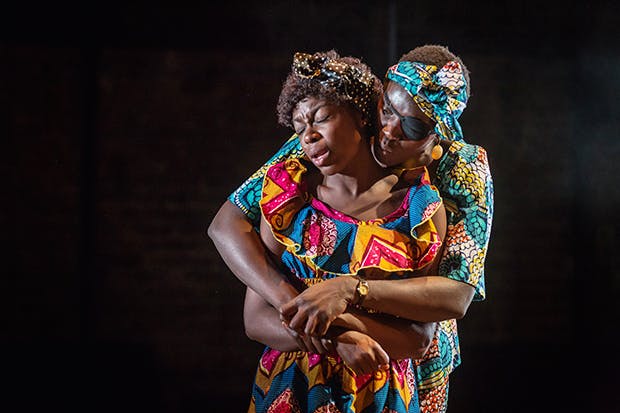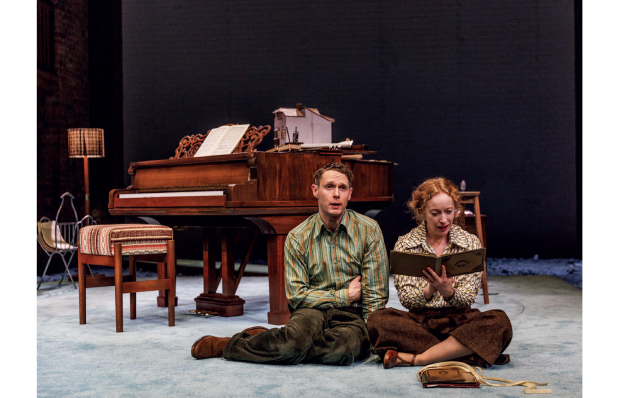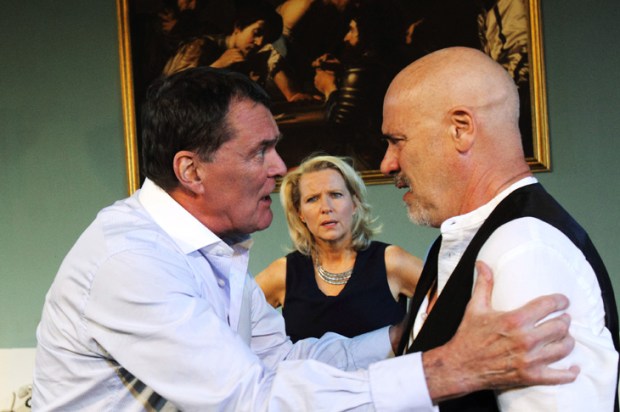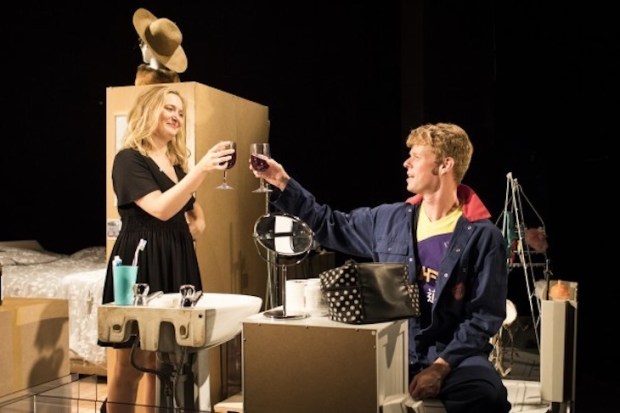In the 1980s, supermarkets stocked a fruit juice named ‘Um Bongo’ with the strapline ‘They drink it in the Congo!’. This is the starting point for Adam Brace’s examination of Britain’s relationship with the Congolese (whose word ‘mbongo’ means money).
A group of do-gooding Londoners host a festival to celebrate the Congo’s culture and history but they rapidly become mired in controversies about age-old injustices and white-to-black ratios on steering committees. The Congolese party includes a few rogue terrorists whose death threats the British publicists find rather glamorous and titillating. The characters rarely reach beyond the obvious. The Londoners are bloodless yuppie go-getters. The Congolese are suspicious, chippy and mistrustful. Early on, they gang up on a female charity worker and demand to know how much she will earn for acting as their hostess. Foolishly she tells them the truth and they howl at her in artificial outrage. The festival soon develops into a tawdry and predictable trade-off. It’s less a celebration of culture than a stick-up job with African scroungers frisking European dimwits for a portion of what both sides refer to as ‘guilt money’.
Brace has given his play a cumbersome and overcrowded design. There are 13 actors playing 27 roles, helped by an on-stage musical ensemble who perform Morrissey hits with ‘ironic’ rainforest rhythms. Occasionally we hop over to the jungle for a spot of murder and child-rape to vary the mood. The play mentions two crucial points only in passing. First, a weekend of poetry and bongo-bashing is unlikely to cure the ills of a central African basket case. Secondly, Britain’s involvement in the Congo is non-existent. The first settlers were Portuguese and they handed over to the Belgians, who turned their acquisition into one of the most brutal slave states in colonial history. Britain bears as much responsibility for Belgium’s misdeeds as it does for Tintin’s quiff.
And Brace never questions the assumption that aid is helpful. Throwing money at incompetence turns it into a commodity. Any African leader who sees his healthcare, sanitation and schooling systems being funded from abroad will ask himself what new areas of ineptitude he can parade before the deep-pocketed morons who throng his country seeking guilt-resolution from the back of an air-conditioned Range Rover. Aid creates a bull market in helplessness and failure. And these are vices that any administration can generate all too easily. The cycle will continue until it’s realised that aid and bad governance are the same thing.
Our Ladies of Perpetual Succour, adapted by Lee Hall from Alan Warner’s novel The Sopranos, follows a troupe of teenager songsters as they travel from a remote Scottish convent to Edinburgh for a talent contest. They get disqualified early on but they couldn’t care less.
The play focuses instead on the heartless mercenary personalities of these young Catholic sex-freaks. When not pillorying their teachers or humiliating the school swot for daring to aspire to a university qualification, the girls screech and boast non-stop about their erotic escapades. The shyest violet in the class admits that she’s unfamiliar with the taste of semen. She explains, in vivid detail, how she attempted to correct this educational oversight in a hospital. Finding an incontinent and terminally ill Swedish cancer patient, she removed the catheter from his penis and attempted to fellate him whereupon he suffered an attack of diarrhoea and punched her in the face. Her classmates lament that she suffers from ‘low expectations’. When their kilts go missing, the teens instantly deduce that the thief must be a bedsit saddo using their stolen knitwear as a masturbatory stimulus. An oddity of the script is that the girls seem to be trapped in a 1970s time warp. They talk of Bryan Ferry, Hawkwind and Opportunity Knocks as if these were brand-new cultural landmarks. They’re also big fans of the Electric Light Orchestra and they occasionally stop cursing and bickering for long enough to offer us a cover tune. But their thumping vocal production is so frenzied and colourless that it makes one yearn for the delicacy and sweetness of Jeff Lynne’s voice.
The purpose of this piece, I would guess, is to celebrate the freedom from sexual inhibition of teenage girls but the show’s creators have ignored the basics of good theatre. The characters are horrible. Their mission is banal. No central figure unifies the plot. The relationships are superficial, unoriginal and dispiriting. Worst of all, the bombastic, screeching dialogue never varies in pace, tone or content.
So why is the NT asking us to share in the experiences of these pompous, jumped-up halfwits? Primarily, I imagine, for the benefit of paedophiles, who like to argue that all youngsters are lust-crazed experimentalists yearning for carnal adventure. That thesis is amply borne out here. So if you’re on the sex-offenders register and the NT mailing list you’re in for a treat.
Got something to add? Join the discussion and comment below.
Get 10 issues for just $10
Subscribe to The Spectator Australia today for the next 10 magazine issues, plus full online access, for just $10.














Comments
Don't miss out
Join the conversation with other Spectator Australia readers. Subscribe to leave a comment.
SUBSCRIBEAlready a subscriber? Log in